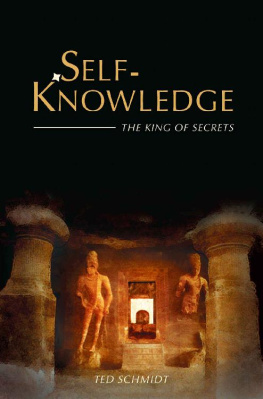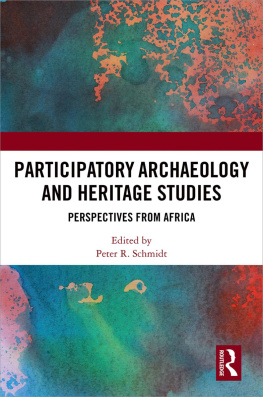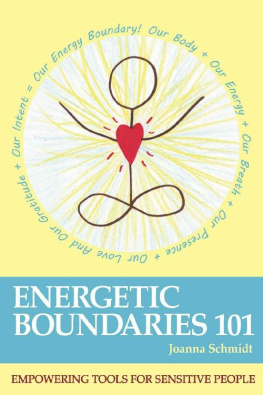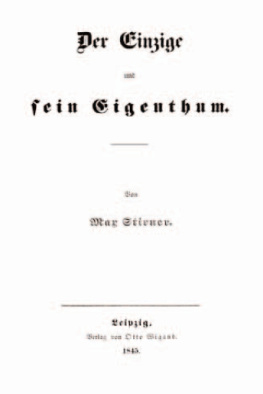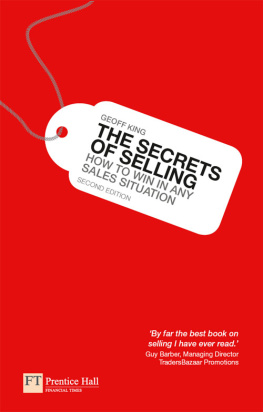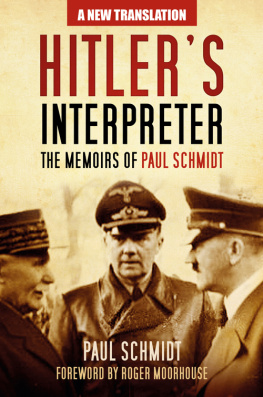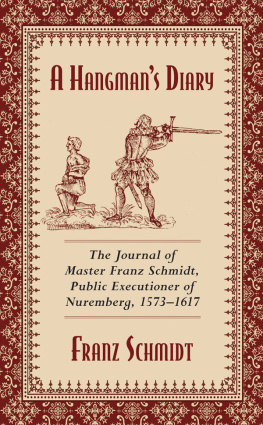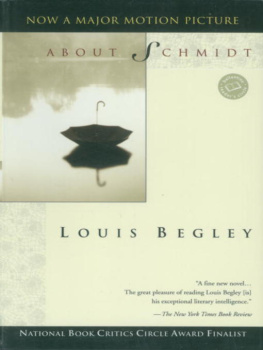Ted Schmidt - Self-Knowledge: The King of Secrets
Here you can read online Ted Schmidt - Self-Knowledge: The King of Secrets full text of the book (entire story) in english for free. Download pdf and epub, get meaning, cover and reviews about this ebook. year: 2016, publisher: Publish Green, genre: Religion. Description of the work, (preface) as well as reviews are available. Best literature library LitArk.com created for fans of good reading and offers a wide selection of genres:
Romance novel
Science fiction
Adventure
Detective
Science
History
Home and family
Prose
Art
Politics
Computer
Non-fiction
Religion
Business
Children
Humor
Choose a favorite category and find really read worthwhile books. Enjoy immersion in the world of imagination, feel the emotions of the characters or learn something new for yourself, make an fascinating discovery.
- Book:Self-Knowledge: The King of Secrets
- Author:
- Publisher:Publish Green
- Genre:
- Year:2016
- Rating:3 / 5
- Favourites:Add to favourites
- Your mark:
- 60
- 1
- 2
- 3
- 4
- 5
Self-Knowledge: The King of Secrets: summary, description and annotation
We offer to read an annotation, description, summary or preface (depends on what the author of the book "Self-Knowledge: The King of Secrets" wrote himself). If you haven't found the necessary information about the book — write in the comments, we will try to find it.
Self-Knowledge: The King of Secrets — read online for free the complete book (whole text) full work
Below is the text of the book, divided by pages. System saving the place of the last page read, allows you to conveniently read the book "Self-Knowledge: The King of Secrets" online for free, without having to search again every time where you left off. Put a bookmark, and you can go to the page where you finished reading at any time.
Font size:
Interval:
Bookmark:
Copyright 2016 by Ted Schmidt
Two Harbors Press
322 First Avenue N, 5th floor
Minneapolis, MN 55401
612.455.2293
www.TwoHarborsPress.com
All rights reserved. No part of this publication may be reproduced, stored in a retrieval system, or transmitted, in any form or by any means, electronic, mechanical, photocopying, recording, or otherwise, without the written prior permission of the author.
ISBN: 978-1-63505-234-3
FIRST AND FOREMOST, I thank James (Ramji) Swartz, my teacher, who showed me who I am and whose systematic presentation of the teaching methodology of Vedantic self-inquiry forms the foundation of this book. I also thank Swami Dayananda Saraswati and Swami Paramarthananda, perhaps the two premier teachers of traditional Vedanta in the modern age, as well as D. Venugopal, whose book, Vedanta: The Solution to Our Fundamental Problem , served as an invaluable reference for the method of self-inquiry as presented by the two aforementioned swamis. In addition, I thank Isabella (Sundari) Viglietti, whose insights regarding the management of the three energies ( triguna vibhava yoga ) provided the basis for the presentation herein of that topic. Vedanta is not a subject that one can teach oneself, and it is the impeccable unfoldment and faithful rendering of the teachings by these jnanis , or knowers of the truth, upon which this book is based. Finally, I thank my mother and father, whose unconditional love, guidance, and support provided a strong foundation for spiritual growth and who are thus the indirect benefactors of this book.
THE KING OF SECRETS
This is the king of all knowledge, the king of secrets...
Bhagavad Gita (9.2)
This is the king of all knowledge, the king of secrets...
Bhagavad Gita (9.2)
THE KNOWLEDGE OF THE self that is revealed through the systematic teaching methodology of Vedantic self-inquiry, as set forth in this book, is different from any other type of knowledge. Because this knowledge essentially renders all else as good as known, it marks the end of the quest for knowledge. More important, it alone puts an end to suffering.
Just as a king has final authority among the many inhabitants of his kingdom, so too is this knowledge king among the various disciplines of knowledge . In Sanskrit, the word for king is raja , which is derived from the root raj , to shine. The king is the one who shines on his own, who does not depend upon anything else. Similarly, the limitless eternal self is the sole being who is self-effulgent.
Self-knowledge is the king of knowledge because all other forms of knowledge depend upon the self, the limitless field of illumination in which all objects appear. While all relative, informational knowledge is revealed by the light of the intellect, the self stands revealed by its own autonomous luminosity.
Whats more, there is no other knowledge that, once known, renders everything else as good as known. All relative knowledge, by definition, leaves behind a bit of ignorance (i.e., the more we know, the more we know what we dont know) because knowledge without the vision of the whole is never complete. The secret is that, despite all appearances to the contrary, the whole happens to be the self. In other words, you are both whole and the whole. To know that you are limitless awareness, the light by which all that is and is not is known, from whose illumination nothing remains excluded, is therefore to have complete knowledge.
The self is the very essence of your being, that which would seemingly be the most familiar aspect of you. Nevertheless, Lord Krishna, speaking as the self in the Bhagavad Gita, refers to self-knowledge as the king of secrets. Why?
While any secret can be stumbled upon and virtually all conundrums can be worked out if given due consideration, the self can seem a virtually uncrackable code. Any other secret is available for disclosure because as a knower you have the means by which to know it. In other words, your senses and intellect are sufficient instruments by which to understand any object. The self, however, is the essence of the knower. It is, we might say, knowing itself. As such, it is not available for objectification. That is, it cannot be known by the means of knowledge with which you have been equipped perception and inferencewhich only work with regard to objects.
About the knower who goes about unraveling all secrets, then, there is a great secret. The knower is what is to be known. What you seek is what you are. Due to the inherent limitations of your investigative instrument, however, you are not going to figure it out on your own. The secret needs be revealed by some other source.
It is like wanting to see your eyesit is impossible by your own efforts; a mirror is the only viable means. Similarly, that you exist and are aware is obvious, but to see (i.e., understand) the true nature of that awareness, you need a word mirror. This is what Vedanta provides. This word mirror can reflect your limitless, attributeless, non-objectifiable nature. Ironically, until this fact is known, your very own self remains the king of secrets.
Invocation
Om saha navavatu
Saha nau bhunaktu
Saha viryam karavavahai
Tejasvi navadhitam astu
Ma vidvisavahai
Om. May we, teacher and student, be protected together.
May we enjoy the fruits of our actions together.
May we achieve strength together.
May our knowledge be full of light.
May we never have enmity for one another.
Om shanti shanti shanti
Om. Peace! Peace! Peace!
THE STUDY OF VEDANTA
NON-DUALITY IS DEFINITELY ON the short-list of topics now trending in todays spiritual supermarket. A plethora of websites, blogs, and books harbor millions of words that express in innumerable variations the fundamental fact that we are all one. Voices from fields as varied as pop media, behavioral psychology, mind-body medicine, environmental activism, and twelve-step recovery programs suggest the underlying singularity of the universe. A legion of teachers hosts satsangs, seminars, conferences, cruises, therapy sessions, and retreats that purportedly will facilitate ones total immersion in the truth of not-two-ness. Even the world of material science is making a dedicated effort to pinpoint the God Particle and thereby prove the existence of a unified field with a single set of governing laws that accounts for everything.
From one perspective, this spiritual awakening might be seen as a positive step in the right direction, for it suggests that more people are seeing throughor are at least beginning to lose some degree of faith inthe thin veneer of false promise inherent in the pursuit of object-happiness. However, the vast majority of beliefs, opinions, insights, intuitions, channelings, revelations, visions and various other profound experiences that are accepted as valid signs of spiritual awakening, increased self-awareness, and enlightenment are nothing more than erroneous interpretations of experience, foolhardy desires for self-improvement or personal gain, and ill-conceived notions concerning what constitutes ultimate truth.
Amid this display of mostly costume jewelry besprinkled with a few semiprecious gems shines a gleaming jewel of spiritual discrimination and discernment whose light has served as a beacon by means of which countless seekers throughout the millennia have realized their true identity as limitless, all-pervasive, non-dual awareness.
Font size:
Interval:
Bookmark:
Similar books «Self-Knowledge: The King of Secrets»
Look at similar books to Self-Knowledge: The King of Secrets. We have selected literature similar in name and meaning in the hope of providing readers with more options to find new, interesting, not yet read works.
Discussion, reviews of the book Self-Knowledge: The King of Secrets and just readers' own opinions. Leave your comments, write what you think about the work, its meaning or the main characters. Specify what exactly you liked and what you didn't like, and why you think so.

